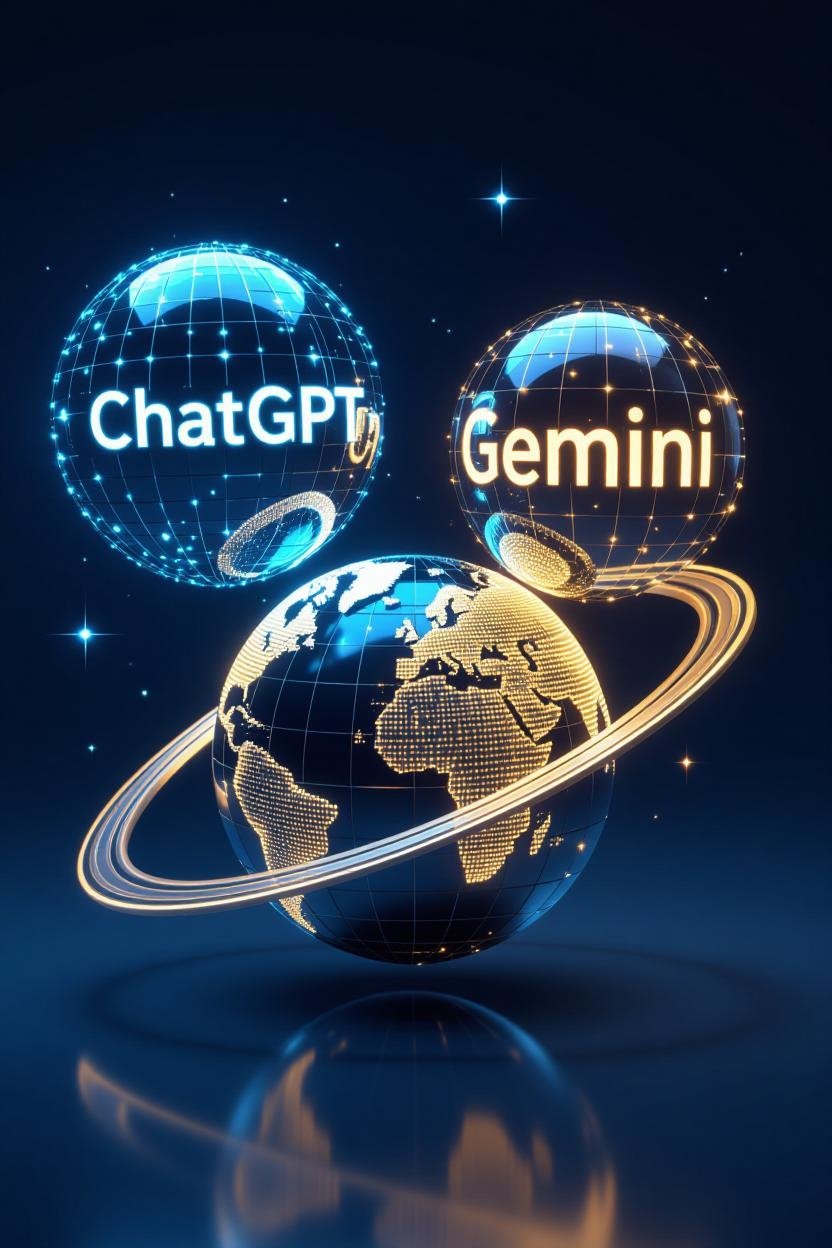From 1975 through 2025: The Evolution of Everyday Wonders.
Back in 1975, everyday wonders weren’t commonplace. Technology stayed exclusive to a select few. Radios were the prime medium of entertainment, NASA’s moon landing was fresh in memory, and computers were giant machines hidden inside research labs. Innovation felt infrequent, monumental, and nearly unreachable.
Fast forward to 2025—miracles happen every single day, and they fit right inside our laptops, browsers, and even smartphones. Artificial Intelligence is now a routine presence instead of science fiction; it’s an everyday ally. For developers, the most significant advancements are tools that can not only understand code but also compose, debug, and enhance it.
Among the leaders in this space, two names dominate: ChatGPT (by OpenAI) and Gemini (by Google DeepMind). Both are formidable. Both are revolutionary. But how do they actually perform when it comes to coding?
Let’s explore…
The Competitors: A Quick Snapshot
ChatGPT
– Created by OpenAI.
– Commonly-used tools include GitHub Copilot, ChatGPT plugins, API support.
– Renowned for its extensive conversation style and excellent debugging capabilities.
– Widely accepted across industries.
Gemini
– Created by Google DeepMind.
– Effortless compatibility with Google tools (Docs, Search, Colab).
– Powerful multimodal functions (interprets images and text).
– Quick, accurate, and closely integrated with the Google ecosystem.
Side-by-Side Coding Comparisons
To make this fair, we asked both ChatGPT and Gemini to handle common developer tasks.
1. Code Generation
Prompt: “Write a Python function to scrape the titles of blog posts from a given URL and save them in a CSV file.”
ChatGPT Output:
import requests
from bs4 import BeautifulSoup
import csv
def scrape_blog_titles(url, filename=”titles.csv”):
response = requests.get(url)
soup = BeautifulSoup(response.text, “html.parser”)
titles = [h2.get_text(strip=True) for h2 in soup.find_all(“h2”)]
with open(filename, “w”, newline=””, encoding=”utf-8″) as file:
writer = csv.writer(file)
writer.writerow([“Title”])
for title in titles:
writer.writerow([title])
print(f”Saved {len(titles)} titles to {filename}”)
✅ Clean, well-structured, includes file writing, and user-friendly print statement.
Gemini Output:
import requests
from bs4 import BeautifulSoup
import csv
def scrape_titles(url):
r = requests.get(url)
soup = BeautifulSoup(r.content, “html.parser”)
titles = [t.text for t in soup.find_all(“h2”)]
with open(“titles.csv”, “w”) as f:
writer = csv.writer(f)
writer.writerow([“Title”])
writer.writerows([[t] for t in titles])
✅ Shorter code, but less descriptive (no error handling or confirmation message).
Verdict: ChatGPT produces more user-friendly, production-ready code. Gemini is faster but feels more barebones.
2. Debugging
Prompt: “This JavaScript function is not working. Fix it.”
function addNumbers(a, b) {
return a + b
console.log(“Result is: ” + a + b);
}
ChatGPT Debugged Code:
function addNumbers(a, b) {
const result = a + b;
console.log(“Result is: ” + result);
return result;
}
✅ Corrects order, introduces a result variable, and makes console output accurate.
Gemini Debugged Code:
function addNumbers(a, b) {
console.log(“Result is: ” + (a + b));
return a + b;
}
✅ Fixes console issue but doesn’t add clarity with intermediate variable.
Verdict: ChatGPT provides clearer, more readable fixes. Gemini is correct but minimal.
3. Code Explanation for Beginners
Prompt: “Explain this React snippet to a beginner.”
function Greeting({ name }) {
return <h1>Hello, {name}!</h1>;
}
ChatGPT Explanation (summary):
- Explains function components in React.
- Breaks down { name } as destructuring props.
- Describes JSX as HTML-in-JavaScript.
Gemini Explanation (summary):
- Explains React component as a reusable function.
- Notes name is passed from parent component.
- Short and straightforward, but less beginner-friendly detail.
Verdict: ChatGPT is more educational, Gemini is more concise.
Strengths & Weaknesses
- ChatGPT
- ✅ Detailed explanations, great for debugging & teaching.
- ✅ More polished, production-ready answers.
- ❌ Sometimes longer than necessary.
- Gemini
- ✅ Faster, shorter outputs.
- ✅ Great integration with Google tools (Docs, Colab).
- ❌ Less context depth in explanations.
Which Should Developers Use?
- If you’re a professional developer working on complex projects → ChatGPT feels like a reliable coding partner.
- If you’re a student or quick prototyper who wants fast answers → Gemini may feel lighter and faster.
- Realistically, many developers will end up using both depending on the task.
Overall,
In 1975, humanity celebrated miracles once a decade. In 2025, we witness them every day—especially in the world of coding. AI assistants like ChatGPT and Gemini have made programming faster, smarter, and more accessible than ever.
Whether you prefer ChatGPT’s depth or Gemini’s speed, one thing is clear: the future of coding is no longer about writing every line yourself, but about collaborating with AI.
Thanks to read this.
– Pankaj Sharma
CEO, Netleon IT Solutions
More Blogs You May Like
- How to Build a Secure and Scalable Mobile Banking App
- Web App Development : How to get the Budget Right?
- Best Metaverse Development Solutions Company
- How do Digital Marketing Companies Transform Businesses in Digital Age?
- Developing Best e-Card Maker App & How Much It Costs?
- How Can Small Businesses Develop a WordPress Website Effectively?
- Digital Marketing Trends and Importance of User
- How to Identify the Best Partner for Custom Software Development?
- Best Digital Marketing Services in USA
- The Best Website Design Company in the USA


